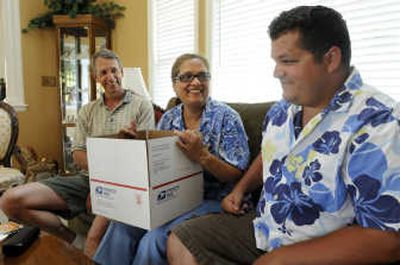Pen pals send support to troops overseas

Keka Wessman has her own little army. Unfortunately, they’re not all at home.
Her husband, Larry, a retired Army helicopter pilot, fought in the first Gulf War. Her oldest son, Carlos Rodriguez, 35, who lives in Lakewood, Wash., was an Army Ranger wounded in Mogadishu, Somalia. Her youngest son, Daniel, 28, will leave Spokane for his second Iraq tour in August.
Her middle son, Eduardo Rodriguez, 33, a Gonzaga University graduate and commander of an Army artillery battalion, left his station in Germany in April to begin his second tour in Iraq.
Wessman spoke to Eduardo in May and asked how his soldiers were doing. He said morale was low; many of them had received nothing from home.
How many soldiers, Wessman asked.
“He said, ‘Three.’ I said ‘Only three?’ Well three turned into 26. Twenty-six soldiers had received absolutely nothing from home,” she said.
After a barrage of e-mails to family and friends, Wessman recruited 26 people to “adopt” the soldiers, most of whom were single or whose parents “don’t care or can’t send them anything,” Wessman said. She encouraged the pen pals to send their soldier letters and packages as often as they wanted, but at least once a month. The soldiers have an odd assortment of requests and needs: gum, wet wipes, lip balm, sandwich bags, foot powder, instant oatmeal, hot chocolate, beef jerky and Sudoku puzzles.
Soon after sending her first round of packages, Wessman, who personally adopted two soldiers, talked to her son.
“He sounded so happy. And I thought, ‘He’s in Iraq. How can he be happy?’ ” she said. “We take so much for granted here. We don’t realize what we can do for the morale there.”
Eduardo recommended extending the service to other companies, but Wessman had exhausted her personal contacts.
A few weeks ago, Wessman’s husband went to the Nine Mile Falls post office with a package for Eduardo. Two female employees, touched by Wessman’s project, signed up on the spot to adopt two soldiers.
“Do you know what it’s like to have a stranger thank you for what you’re doing?” Wessman said. “It’s the knowledge that someone cares.”
The post office employees were so excited about the project, which now has 30 people involved, that they hung up photos of the soldiers they adopted. Wessman posted a picture of Eduardo on the post office wall immediately.
“One customer said, ‘Is he alive?’ when he saw the photo. He said every time he saw pictures of soldiers like that they had died,” she said. “We want to celebrate and support the soldiers’ work.”
The family of Spokane resident Pam Stanley has sent packages to soldiers in Iraq in the past.
Two years ago, for example, “our family went crazy,” she said. “We had a record number of boxes going to one soldier. Eighteen!”
Stanley, a friend of Wessman’s neighbor, now sends packages to Eric, her adopted soldier.
“It’s an honor to do something like this,” she said. “It brings tears to your eyes to think that they’re over there and no one’s writing to them.”
Stanley said she hopes this makes them feel closer to home. Her husband, who fought in Vietnam in the late 1960s, felt unappreciated when he came home, she said.
Wessman provided a similar service when Daniel was a platoon leader in Iraq in 2005.
“It was fantastic,” Daniel said. “I already knew I was going to get good things, but a lot of my soldiers didn’t get anything. It didn’t matter what was in the package; their whole attitude changed.”
Daniel, an Army infantry officer who’s been in the service for six years, said it’s especially important for Eduardo’s troop, stationed so far from home.
“They live in Germany, so they may be away from their family four, five, six years and then they go further abroad. So to get any mail has to be a good thing.”